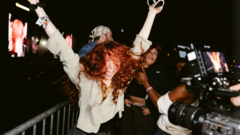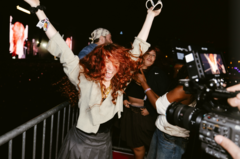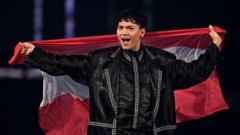In the whirlwind of the Eurovision Song Contest, a dedicated team works meticulously to keep the show running smoothly. Tasked with a staggering thirty-five seconds to execute intricate set changes, these professionals, often dubbed the “invisible crew,” exemplify efficiency under pressure.
Richard van Rouwendaal, the stage manager, likens their process to a Formula 1 pit stop: each crew member has a specific role, rushing on stage with just one item, whether it be a light bulb or prop. “You have to stay in the right line—deviate, and you risk collisions,” he explains. The crew practices these split-second transitions for weeks before performers even arrive, optimizing every second of their choreographed routine.
This year’s contest, held in Liverpool, required extensive planning. Van Rouwendaal coordinates around 43 crew members—13 from the Netherlands and 30 locals—to streamline logistics. Each performance's demands are carefully mapped out; this attention to detail ensures all equipment, including microphone stands customized to the performers’ needs, is ready before the act begins.
The meticulous focus on cleanliness is crucial too. A stage free of footprints is essential for maintaining the spectacle of the show. Furthermore, crew members work behind the curtains, ensuring props are meticulously moved in and out of sight through elusive passageways dubbed "smuggling routes."
Last year's contest featured a memorable instance where an electric guitar seemingly appeared out of thin air during a live performance. Behind that trick was Van Rouwendaal, who discreetly provided the guitar while the camera panned away. “Choreographed to the nearest millimetre,” he confirms, revealing the behind-the-scenes magic that viewers often overlook.
However, should mishaps occur—like a falling prop or camera malfunction—there are contingency plans in effect. Directors can cut to audience shots or pre-recorded material, ensuring continuity. The backstage crew must remain focused and adaptable, as they have trained for every conceivable scenario.
The pressures of producing a live event can take a toll; the crew often faces intensive hours leading up to the performances. Nevertheless, amidst the stress, it's vital for Van Rouwendaal and his crew to enjoy their time together. They foster camaraderie by sharing snacks and celebrating successful rehearsals.
As the countdown to the performances continues, the crew works tirelessly to ensure every aspect aligns for a flawless show. Their hard work may go unseen, but without their expertly coordinated efforts, Eurovision would undoubtedly face significant challenges. If everything goes as planned, the crew will remain invisible on stage while making the spectacle of Eurovision shine brightly across screens globally.
Richard van Rouwendaal, the stage manager, likens their process to a Formula 1 pit stop: each crew member has a specific role, rushing on stage with just one item, whether it be a light bulb or prop. “You have to stay in the right line—deviate, and you risk collisions,” he explains. The crew practices these split-second transitions for weeks before performers even arrive, optimizing every second of their choreographed routine.
This year’s contest, held in Liverpool, required extensive planning. Van Rouwendaal coordinates around 43 crew members—13 from the Netherlands and 30 locals—to streamline logistics. Each performance's demands are carefully mapped out; this attention to detail ensures all equipment, including microphone stands customized to the performers’ needs, is ready before the act begins.
The meticulous focus on cleanliness is crucial too. A stage free of footprints is essential for maintaining the spectacle of the show. Furthermore, crew members work behind the curtains, ensuring props are meticulously moved in and out of sight through elusive passageways dubbed "smuggling routes."
Last year's contest featured a memorable instance where an electric guitar seemingly appeared out of thin air during a live performance. Behind that trick was Van Rouwendaal, who discreetly provided the guitar while the camera panned away. “Choreographed to the nearest millimetre,” he confirms, revealing the behind-the-scenes magic that viewers often overlook.
However, should mishaps occur—like a falling prop or camera malfunction—there are contingency plans in effect. Directors can cut to audience shots or pre-recorded material, ensuring continuity. The backstage crew must remain focused and adaptable, as they have trained for every conceivable scenario.
The pressures of producing a live event can take a toll; the crew often faces intensive hours leading up to the performances. Nevertheless, amidst the stress, it's vital for Van Rouwendaal and his crew to enjoy their time together. They foster camaraderie by sharing snacks and celebrating successful rehearsals.
As the countdown to the performances continues, the crew works tirelessly to ensure every aspect aligns for a flawless show. Their hard work may go unseen, but without their expertly coordinated efforts, Eurovision would undoubtedly face significant challenges. If everything goes as planned, the crew will remain invisible on stage while making the spectacle of Eurovision shine brightly across screens globally.




















